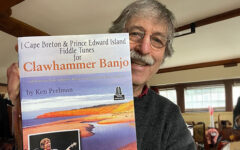
Jack Tottle has shared his comments to a Washington Post article from last weekend, a partial transcription of an Instagram Live interview with Chris Thile. We start with something Chris said in the interview, followed by Jack’s response.
————-
Recently, Edgers chatted with songwriter and mandolin whiz Chris Thile.
Q: I want to ask you about Nickel Creek and your work as a teenager. Do you listen back to those things and say, “Boy, I really was pretty good when I was like 15,” or do you listen back and say, “Boy, how can I erase that off the Internet?”
A: I’m not one of those people who just pretend it didn’t happen, but I used to, man. I used to have that relationship to some of that old Nickel Creek material. . . . But now I have a very different relationship with it. All of a sudden it just feels like that was another step. And now having had that experience with other people’s music, I’m just happy that it means something to people. So now I’m finding myself being able to hear that old music from another perspective and enjoy it for what it is, as opposed to what I maybe wish it were.
————-
Nice to see a piece on Chris Thile. However, calling him a “mandolin whiz,” is kind of like calling Paganini a fiddle whiz, Béla Fleck a banjo whiz, or Jake Shimabukuro a ukulele whiz. All have vastly expanded the range of their instruments past what anyone had previously envisioned.
Nevertheless, it seems to me a bit sad that he apparently once felt shame for his bluegrass and progressive bluegrass-based performances, both live and recorded. Even now, he seems to regard them as forgettable stepping stones to his present level of musical accomplishment.
I met Chris after a performance at the International Bluegrass Music Association’s annual conference and trade show in Owensboro, Kentucky. I’m guessing he was eleven years old or so, and was playing with top bluegrass artists including legendary banjo innovator Bill Keith, and fiddler extraordinaire Richard Greene.
Chris was a bright-eyed, enthusiastic, and endearing youngster, who was already sounding like a top-flight seasoned pro. It was obvious he had already absorbed the innovations of the great bluegrass mandolinists and fashioned his own approach, which fit like a glove with bluegrass of that era. No outsize ego was in evidence, just innocent excitement at being a part of the bluegrass world.
As with all great musicians, Chris has “stood on the shoulders of giants.” Without the mandolin innovations of the Father of Bluegrass, Bill Monroe, and a host of his younger protégés, the music that shaped Chris Thile’s first forays into music would not have existed.
Béla Fleck—despite his remarkable accomplishments into jazz, classical, and his new original musical concepts—has never placed himself above, or lost his reverence for, the music which started him on his journey—the unique bluegrass banjo virtuosity of Earl Scruggs.
So, Chris, all good wishes as you take on new challenges, musical and otherwise. But please try not to dismiss those of us who appreciate your wonderful earlier work.







